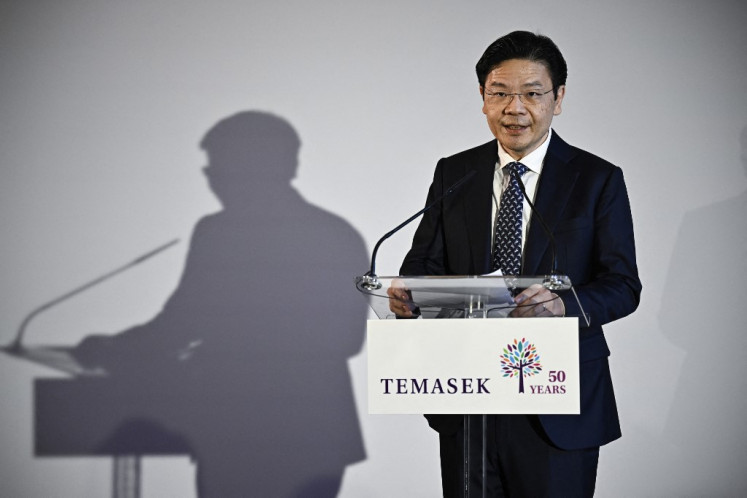Balancing options between opposition and govt
Prelude: Indonesian Democratic Party of Struggle (PDI-P) chairwoman Megawati Soekarnoputri (second right) along with her children Prananda Prabowo (right) and Puan Maharani (third left) welcome Gerindra Party chairman Prabowo Subianto (fourth left) to her residence in Menteng in Central Jakarta on July 24
Change Size

P
relude: Indonesian Democratic Party of Struggle (PDI-P) chairwoman Megawati Soekarnoputri (second right) along with her children Prananda Prabowo (right) and Puan Maharani (third left) welcome Gerindra Party chairman Prabowo Subianto (fourth left) to her residence in Menteng in Central Jakarta on July 24. (JP/Dhoni Setiawan)
The eventual inclusion of two key personnel of the Gerindra Party — the core element of the election-losing Koalisi Adil-Makmur (Fair and Prosperous Coalition) — in the 2019-2024 Cabinet of President Joko “Jokowi” Widodo has dramatically altered the political constellation in the postelection era. The Koalisi Adil-Makmur suddenly crashed, leaving the Prosperous Justice Party (PKS) the only political party openly declaring itself as an opposition force for the next five-year government term. The Jakarta Post’s Nurul Fitri Ramadhani and Imanuddin Razak examine the prospects of opposition in a multiparty system.
After President Joko “Jokowi” Jokowi secured reelection in the April 17 presidential election, many believed that the Gerindra Party, which led the now-defunct Koalisi Adil-Makmur (Fair and Prosperous Coalition), would lead a weak opposition. However, as Jokowi proceeded to include Gerindra chairman Prabowo Subianto and deputy chairman Edhy Prabowo into his new Cabinet it became apparent that the losing coalition leader had jumped ship to the rival camp.
Signals of Jokowi’s intention to embrace non-coalition elements in the government emerged after he invited important figures to closed-door meetings at the State Palace. Days before appointing Prabowo as defense minister and Edhy as maritime affairs and fisheries minister, for instance, the President invited both of them to the palace.
Technically, the opposition force now only has three political parties left — the Democratic Party, the National Mandate Party (PAN) and the Prosperous Justice Party (PKS). In sum, the three parties control 148 of the total 575 seats in the House of Representatives — the Democrats with 54 seats, the PKS 50 seats and PAN 44. In contrast, the ruling coalition, which includes newly joined Gerindra, controls 427 seats in the legislature, or around 75 percent.
Of the three, however, only the PKS has remained firm positioning itself as an opposition party for the next five years.
The Democrats are thought likely to follow Gerindra’s lead in joining the ruling coalition sooner or later. Signals of its ambiguity have been observed since the beginning of the 2019 presidential election campaign.
Instead of being proactively involved in the Prabowo-Sandiaga Uno election campaign, the Democrats obviously prioritized its campaign for the legislative election, which was simultaneously held along with the presidential election. Back in August 2018, the Democrats were also the last political party to proclaim support for the Prabowo-Sandiaga candidacy.
Until now, however, the Democrats remain outside the Jokowi government’s coalition. In a recent interview with The Jakarta Post, party deputy chairman Agus Harimurti Yudhoyono, who is also son of Democrat chairman and former president Susilo Bambang Yudhoyono, did not explicitly state its position as an opposition political party, but gave an assurance that the Democrats would properly perform its “checks and balances” role by criticizing government policies that are contrary to the interests of the people.
Agus, however, did not dismiss the possibility of joining the government coalition in the future.
“We position ourselves as critical of the government, but that doesn’t mean there will be no political dynamics in the future,” Agus maintained.
“After all, [government] coalition membership is a result of consensus achieved by Jokowi and the political parties in his coalition. So being outside the government is not necessarily of our own choice,” he said further.
Agus admitted, however, that there had been no invitation from Jokowi to the Democrats in regard to Cabinet membership.
“We respect the President’s prerogative to form his Cabinet. He knows the most suitable persons to serve him as ministers,” he said.
Similar to the Democrats, PAN has not declared itself as a purely opposition force. The Muslim-based party has decided to either criticize or support the government’s policies on different issues, depending on what it perceives to be the interests of the people.
PAN jumped ship following the 2014 presidential election, which also saw Jokowi and Prabowo compete for the state leadership. At that time, the party endorsed Prabowo and former PAN chairman Hatta Radjasa as presidential and vice-presidential candidates. Not long after Prabowo lost to Jokowi in the 2014 race, PAN shifted to the government’s camp, a decision that eventually won the party one Cabinet seat. In the 2019 election, PAN moved back to the opposition camp, endorsing the Prabowo-Sandiaga pair.
PAN secretary-general Eddy Soeparno said the party had to listen to its constituents and supporters, whose voices are divided following the election. Some of them want the party to stay in the opposition camp, but others would love to join the government.
“Learning from our past experiences, it is better for PAN, for now, to be at the center, while maintaining our platform as a religious-nationalist party and showing [the people] that we are a pluralist party,” Eddy recently told the Post.
PAN has always been associated with Muhammadiyah, the country’s second-largest Muslim organization. Muhammadiyah’s official position was expected to give a boost to Prabowo-Sandiaga pair in the 2019 presidential contest. However, a number of Muhammadiyah regional offices actually declared support for Jokowi’s reelection, with former PAN chairman Soetrisno Bachir once saying that most Muhammadiyah members voted for Jokowi.
Speaking about the party’s political stance in the future, Eddy suggested that it might change, depending on who will lead the party next, as PAN will hold a national congress to elect a new party leader next March.

Some executives within the party have mentioned that chairman Zulkifli Hasan will likely be the front runner in the upcoming congress. Under his leadership, it is largely anticipated that the party will join the government camp. On the other hand, contenders like deputy chairmen Hanafi Rais and Mulfachri Harahap, would be expected to keep the party in opposition if elected.
Hanafi is a son of Amien Rais, one of the party’s founders who is known as an outspoken critic of Jokowi. Amien serves as the party’s advisory board chairman and is believed to have played a significant role in influencing PAN’s decision-making processes.
Eddy, however, was of the opinion that PAN would benefit more if it joined the government camp and worked together with other parties in the coalition.
There will be simultaneous regional elections next year, which will require all parties, including PAN, to establish coalitions with other parties in forming regional administrations and legislatures.
While Democrats and PAN are currently in “wait-and-see” mode in regard to joining Jokowi’s coalition, the PKS is the only opposition political party.
PKS chairman Sohibul Iman has maintained that his party will stay outside the government for the sake of checks and balances, regardless of several offers for the party to join the ruling coalition.
“We will abide by the decision made by the supreme body, the majelis syuro [advisory council], to remain outside the government for the five years ahead,” Sohibul told the Post in a recent interview, citing several surveys that, he claimed, showed that 70 percent of Indonesian people wanted the existence of an opposition to supervise the government and perform an opposition role.
“If all parties join the ruling coalition, then who will do the checks and balances?” he said.
Sohibul revealed that after the Constitutional Court issued its ruling on the general election dispute that gave the victory to Jokowi, Prabowo asked him to join the ruling camp.
“Prabowo said ‘let us together [move] into the Jokowi [coalition] and become part of the government’. He also mentioned about reconciliation,” Sohibul said.
“I told him that we agreed about the reconciliation but that didn’t mean we [PKS] should be there [inside the government],” he added.
The PKS was invited to a meeting with Jokowi as revealed by PKS executive Hidayat Nur Wahid, who was approached by State Secretary Pratikno after the inauguration of the People’s Consultative Assembly (MPR) speakership on Oct. 1. The offer was politely rejected on the grounds that Jokowi’s new Cabinet had yet to be formed.
“We didn’t want the public to see the [planned] meeting as political negotiations over Cabinet seats. Since then, we haven’t been asked again,” Sohibul said.
With the PKS being the only formal opposition force, it is questionable how the checks and balances would work effectively. In the 2019 legislative race, the PKS secured only 8.21 percent of the popular vote, 50 House seats — too small to be able to make a difference. In addition, the party failed to secure a seat on the House’s speakership board, the House’s decision-making body.
Even if the Democrats and PAN joined hands with the PKS, the three parties’ control of only about 25 percent of seats at the House would mean that the Democrats, PAN and PKS could not guarantee that the opposition could hold the government to proper scrutiny.
Agus, however, is optimistic that opposition parties can be strong if they fight for the people’s interests and aspirations.
“We may be small in terms of legislative power, but we will be powerful if the people are with us,” the Democratic Party deputy chairman said.
Sohibul was similarly confident that members of the ruling coalition will not always back Jokowi, particularly when it comes to legislative issues as in reality parties do not fight for the same platforms.
“For example, we’ve criticized the Health Care and Social Security Agency [BPJS Kesehatan] program, along with several coalition member parties, including the PKB [National Awakening Party]. That’s why we believe that actually we are not really a lone opposition force,” Sohibul said.
The PKS is also sure that Jokowi’s coalition will only be solid for three years.
“After that, the parties will go their own ways because the 2024 presidential race will be an open battleground and Jokowi will not be running,” Sohibul said.
It remains to be seen whether the expanded ruling government coalition will be able to curb opposition voices and complete its five-year term smoothly, or will it have to deal with significant challenges or obstacles along its way. Anything can happen in politics as politics itself is defined as the art of the possible after all.









